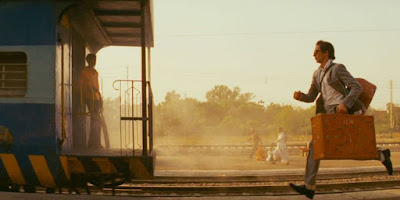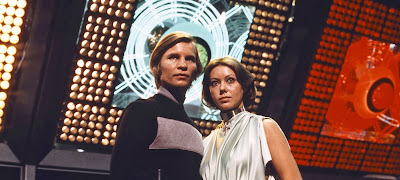There's something almost mythical about the seminal 1976 sci-fi movie Logan's Run. While it certainly enjoys cult status in this day and age, there's an air of excitement at the mere mention of its name. People who haven't even seen it could probably tell you the plot, or might have seen parodies/references in other forms of pop culture.
One instance that comes to mind is Friends. The episode with Denise Richards as Ross and Monica's cousin Cassie (aptly titled The One with Ross and Monica's Cousin) somewhat overstates the film's appeal. While Ross struggles with his feelings for his cousin, his internal monologue shares this thought with the audience: "She was the one who wanted to rent Logan's Run, the sexiest movie ever." While it doesn't live up to that description, there is still a lot to like. And a fair sprinkling of naff stuff too.
I can't remember what gave me the impetus to want to watch it again, but a recent search through various streaming services bore no fruit.
Until a few Monday nights ago.
I saw that it had landed on Netflix as I scrolled through their new additions. I did not hesitate, he he he, and started watching it straightaway, despite the late hour. After about forty minutes, I succumbed to the wave of sleep that was lapping at my brain. But, before that happened, I was enjoying being transported into the future. For those unfamililar with the movie, the year is 2274. You're presented with a seemingly utopian future wherein its occupants live only for pleasure, inside a bunch of geodesic domes. Cut off from the outside world, and history itself, people in this city are harvested rather than born. The idea of knowing your parents or being raised by them is a foreign concept. Each child has a crystal implanted into their palm, which are called 'life-clocks'. The colour of these crystals change as the person ages, and they also dress in clothes of the same colour.
The life clocks start flashing red as you approach your Last Day, which is the age of thirty, and you must go through the ritual of 'carrousel'. This is a ceremony where those who have arrive at their Last Day are gathered in a circle before an audience and fired upon with lasers as they fly in the air. The all-seeing/all-knowing computers that run the city say that there is a chance of being re-born, and the onlookers at the events joyously chant "Renew!" as the thirty-year-olds of their population are summarily executed.
Those unwilling to surrender themselves to the 'carrousel' ritual try to run. This won't do. So the city's computers recruit enforcers called Sandmen to hunt and terminate these runners. The titular Logan is played by Michael York and he is the former, a twenty-six-year-old Sandman enjoying all the pleasures this world offers. For those more familiar with York's work as Basil Exposition in the Austin Powers franchise, it may be quite jarring to see him so young, but still sound so Basil.
Anyway, the powers that be decide that there are too many people unaccounted for. It is suspected by the computers that some of the runners may have possibly escaped the city and found the mythic 'Sanctuary', a place spoken of amongst the small movement of freedom fighters as an alternative to life in the domes. To verify this, Logan is selected to find this Sanctuary, but to create a plausible cover the computer alters his life-clock crystal to flash red, suddenly removing the four years he had left.
The scene in which this happens is my earliest memory of this movie. I would have been fairly young...possibly six or seven. Maybe as old as nine or ten. I'm unsure. But during the time I lived in Morley with my family, I would very occasionally watch a late-night movie on Channel 9 during a house party on our street. Logan's Run was one of these films, and I think I came into it about five or ten minutes after it started. There's not much that really stuck, but those words Logan nervously uttered, "Question: Do I get my four years back?" certainly did.
I don't know why that resonated so much with my young self. Maybe it was the panic in Logan's face. Maybe the idea of having your life shortened was slightly terrifying. The age of thirty would have felt like it was years away at that time, which, let's face it, it was! But, say, if I was 10, then one year would have been one tenth of my life. Now that I'm 45, one year is just one forty-fifth. And don't they fly by?!
I also had memories of the colourful sets and bright clothing, but I'd forgotten that it was Jenny Agutter in the role of Jessica. Logan happens upon her by chance, but ends up connecting with her over the need to find Sanctuary. Peter Ustinov also has a small role, and rising star of the day Farrah Fawcett-Majors appears briefly, complete with THAT hairdo.
But, getting back to my original question, and the title of this blog, what is the deal? What is the excitement that is attached to this movie? Considering this was only a year before the release of Star Wars, the model work is incredibly obvious. When the movie cuts to the monorail transporting characters from place to place it looks like an amazing high school science project, but you can tell it's not real. Interestingly, the film won an Academy Award for its visual effects, particularly the 'carrousel' sequence, which employed the use of wide camera angles and hidden wires. But some of the other practical effects have not aged so well, particularly the robot Box that Logan and Jessica happen upon. It is nearly fifty years old, after all.
There is that thrill of escape that might appeal to many. It's not uncommon in a sci-fi flick for the supposed utopia we are presented with to actually be revealed as a sinister dystopia. So, when the characters try to escape their fate, you're immediately on board. It's like Plato's cave. Once you're exposed to the light, and recover from the shock, you can see what else is around. There's a small measure of delight in seeing Logan and Jessica try and make sense of a world that they never knew existed. They're like newborns in that regard.
One of Logan's Sandman contemporaries, Francis (played by Richard Jordan), starts following Logan and Jessica on their quest to find Sanctuary. His intent to catch them becomes another main plot point, adding a chase element to movie. So there's certainly enough of a story to keep you engaged. You want to know the fates of the characters, and you want to know if Sanctuary exists.

Anyway, in summing up, I would recommend watching the film with an open mind if you haven't seen it before. Enjoy the slightly wooden performances and dodgy effects. Enjoy the thrill of the escape and the possibility of a new life. There is certainly more that could be written, but in the end, it's entertaining and that's what the movies are all about.



















